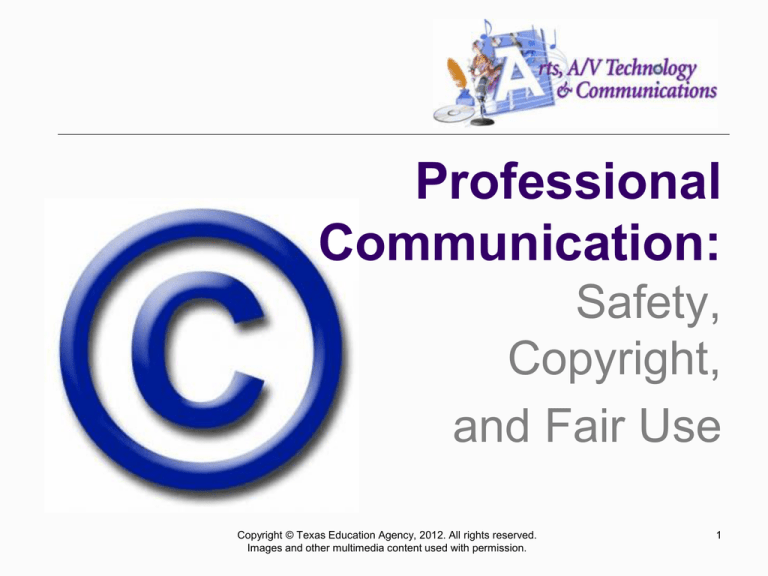
Professional
Communication:
Safety,
Copyright,
and Fair Use
Copyright © Texas Education Agency, 2012. All rights reserved.
Images and other multimedia content used with permission.
1
Computer Lab Safety
No running please.
Coats, bags, and other items should be placed under your
desks or on the coat rack to avoid tripping hazards.
Periodically glance away from the screen. Staring into a
computer monitor too long will strain your eyes.
Let an instructor know if the color scheme, font size, or other
settings of your computer are causing strain on your eyes.
There are many built-in ways to adjust these settings for
comfort.
Avoid long sessions of typing as they may cause repetitive
stress injuries to your hands.
Maintain good posture to ease your back.
Keep the noise level to a minimum.
Be aware of the location of fire exits and fire extinguishers.
Copyright © Texas Education Agency, 2012. All rights reserved.
Images and other multimedia content used with permission.
2
Copyright
The exclusive right to
reproduce, publish,
and sell the matter
and form of a literary,
musical, or artistic
work.
Copyright © Texas Education Agency, 2012. All rights reserved.
Images and other multimedia content used with permission.
3
Creator owns the right to:
Adapt
Reproduce
Distribute
Publicly perform
Publicly display
Transmit
Copyright © Texas Education Agency, 2012. All rights reserved.
Images and other multimedia content used with permission.
4
Adaptation
Adaptation means changing a work in some
way or creating a derivative work.
Books turned into screen plays, movies, and plays
Using a song’s tune with different words, or vice
versa
Placing a work in a computer-aided presentation
or on a website
Copyright © Texas Education Agency, 2012. All rights reserved.
Images and other multimedia content used with permission.
5
Reproduction
Reproduction is making copies
in any format.
Digitizing a photo
Photocopies
Drawing a known cartoon character
Photographing a graphic work
Duplicating a video
Copyright © Texas Education Agency, 2012. All rights reserved.
Images and other multimedia content used with permission.
6
Distribution
Passing out copies
Mailing copies
Loaning copies
Placing on airwaves, radio
waves, etc.
Placing on a network
Emailing copies
Publishing on the Web
Copyright © Texas Education Agency, 2012. All rights reserved.
Images and other multimedia content used with permission.
7
Public Performance
Performing (by means of
any device or process) at a
place open to the public, or
where persons outside a
normal circle of family and
social acquaintances are
gathered.
Copyright © Texas Education Agency, 2012. All rights reserved.
Images and other multimedia content used with permission.
8
Public Display
My Website
Any display
outside the home
of painting,
photograph,
sculpture,
literature, etc.,
including on
websites.
Copyright © Texas Education Agency, 2012. All rights reserved.
Images and other multimedia content used with permission.
9
Digitally Transmit
Local and online
radio stations pay
royalties to record
companies in order
to transmit content
digitally or over
airwaves.
Copyright © Texas Education Agency, 2012. All rights reserved.
Images and other multimedia content used with permission.
10
Copyright: no registration
required!
In order to have protection,
works do NOT have to
say “copyright by”
have the copyright symbol ©
have the registered trademark
symbol ®
The works creator
automatically has all six rights
as designated on slide 4.
Copyright © Texas Education Agency, 2012. All rights reserved.
Images and other multimedia content used with permission.
11
What can students do?
Look for items that are in the public domain.
See if your use
falls under
“fair use.”
guidelines.
Copyright © Texas Education Agency, 2012. All rights reserved.
Images and other multimedia content used with permission.
12
Public Domain
Items in the public domain may be used
without copyright restrictions.
Find these by typing “item name” and “public
domain” in a search engine – music,
graphics, photos, literature, etc.
“popular music” and “public domain”
Copyright © Texas Education Agency, 2012. All rights reserved.
Images and other multimedia content used with permission.
13
FAIR USE
1.
2.
3.
4.
The purpose and character of the use,
including whether such use is of a commercial
nature or is for nonprofit educational purposes;
The nature of the copyrighted work.
The amount and substantiality of the portion
used in relation to the copyrighted work as a
whole; and
The effect of the use upon the potential market
for or value of the copyrighted work. (17 USC, §107)
Copyright © Texas Education Agency, 2012. All rights reserved.
Images and other multimedia content used with permission.
14
Most Important Factor:
The effect upon the potential market for or
value of copyrighted work.
Copyright © Texas Education Agency, 2012. All rights reserved.
Images and other multimedia content used with permission.
15
What to Do
Check the rights of what you are using
• front of book, magazine, or periodical
• on the video or website of video company
• on the photo or website of photo supplier
If it’s not fair use, get permission before using
Copyright © Texas Education Agency, 2012. All rights reserved.
Images and other multimedia content used with permission.
16
ASK!
Don’t take what isn’t yours.
For more information,
Copyright for Schools,
by Dr. Carol M. Simpson,
is available in most school
libraries.
Copyright © Texas Education Agency, 2012. All rights reserved.
Images and other multimedia content used with permission.
17


